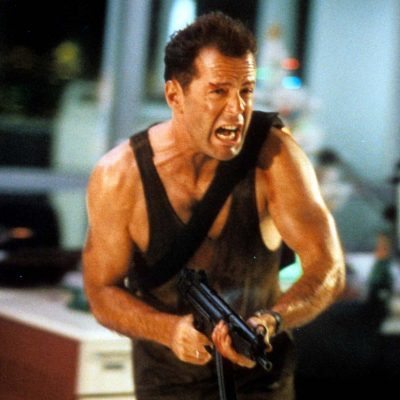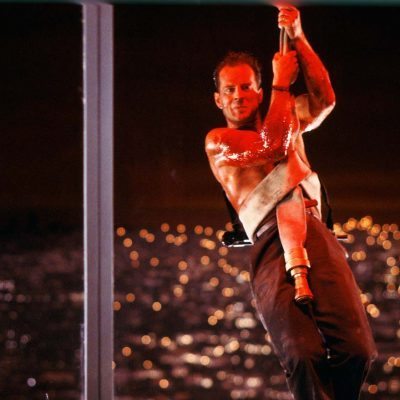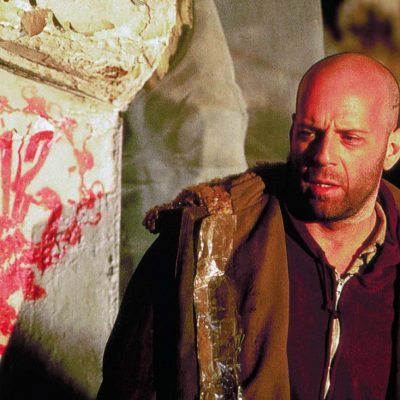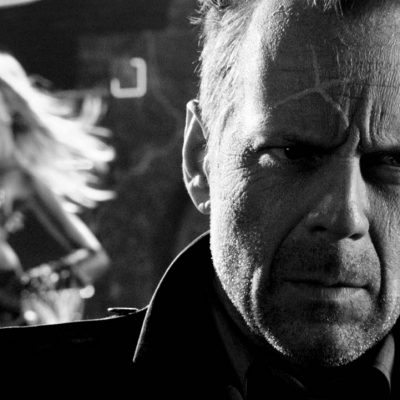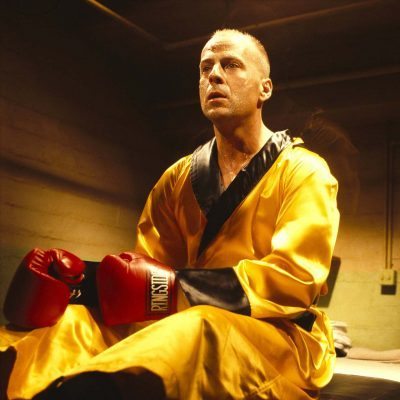THOUGH HE’S FAMOUSLY UNPREDICTABLE, THIS UBER-ACTION-STAR’S MOVES STILL KICK ASS
BY SUSAN HORNIK AND MATT SCANLON
Even though his roles in the first two Expendables movies were relatively minor, it came as a shock to the Hollywood punditocracy when Bruce Willis was summarily and inelegantly cut from the cast of Expendables 3—a move punctuated by an August 6, 2013 tweet from director Sylvester Stallone that read: “WILLIS OUT… HARRISON FORD IN!!!! GREAT NEWS!!!!! Been waiting years for this!!!!” This was followed minutes later by an additional tweet reading, “GREEDY AND LAZY …… A SURE FORMULA FOR CAREER FAILURE.” There’s nothing definitive to link the second statement to Willis, but most seemed to know who the target of the salvo was.
Welcome to the complicated casting and on-set world of Bruce Willis.
Since he first pulled the curtains on our public consciousness during his role in the 1980s ABC rom-com series Moonlighting, Willis has amassed more than the usual share of dust-ups with costars and directors. From friction with Cybill Shepherd toward the end of that series’s run (according to a moonlighting21.com interview with show producer Jay Daniel) to an unattributed but readily acknowledged-tobe-Willis post on the aintitcool.com message board, indicating, about director Michael Bay, “Few people will work with him now, and I know I will never work with him again.” From his lawsuit against the producers of the 2003 film Tears of the Sun (accusing them of creating “extreme mental, physical, and emotional pain and suffering”) to Cop Out director Kevin Smith all but blaming the actor for the failure of that film, and finally to the short-lived feud with Stallone—the gossip fuel has been plentiful, and flammable. Smith (director of Clerks) wrote about his experience working with Willis in his memoir, Tough Shit: Life Advice from a Fat, Lazy Slob Who Did Good (Gotham, 2012):
“Where was the happy-go-lucky charmer who made Maddie Hayes fall so madly in love [in Moonlighting]? There were no staff limbo parties like there’d been at the Blue Moon Detective Agency whenever Bruce was around. The singing pitchman who made me believe that Seagram’s Wine Coolers were a manly enough spirit to chug at a high school kegger? He turned out to be the unhappiest, most bitter, and meanest emo-bitch I’ve ever met at any job I’ve held down. And mind you, I’ve worked at Domino’s Pizza.”
Still, the 61-year-old actor, between last year and this, has starred in or is in production or preproduction of no fewer than 10 films, and has many defenders in powerful places. Last year, the wisecracking (and slightly cantankerous himself) Bill Murray came to Willis’s defense at Comic Con. When a fan asked Murray if Willis was a “jackass” (the two worked together on Moonrise Kingdom and shared a trailer in Morocco while filming Rock the Kasbah), Murray said: “When you’re a movie star, you sometimes have to take matters into your own hands…In the name of entertainment and just respecting the crew…there are people who try to take advantage of a group situation and dominate, and a movie star can step in and say ‘That ain’t gonna happen, boss.’”
While Willis is known for his toughness, age has, in ways, mellowed him. Last year, while on vacation in Berlin, the Die Hard actor left a server an impressive $900 tip, after waiting on him for a meeting that included his wife and 13 business partners.
It’s also hard to argue with the sheer size of his success. Willis is one of the wealthiest actors in the world—therichest.com cites his net worth at a whopping $180 million. According to IMDB.com, he has appeared in films that have grossed in excess of $2.5 billion, placing him in the top ten stars in terms of box office receipts. His career has included such diverse characters as the prizefighter in Quentin Tarantino’s Pulp Fiction; the philandering contractor in Robert Benton’s Nobody’s Fool; a heroic time traveler in Terry Gilliam’s 12 Monkeys; the traumatized Vietnam veteran in Norman Jewison’s In Country; a compassionate child psychologist in M. Night
Shyamalan’s Oscar-nominated The Sixth Sense (for which he won the People’s Choice Award) and, of course, for his signature role, Detective John McClane, in the Die Hard franchise. The five films in that series, which have stretched over 25 years, grossed a total $1.44 billion, according to Boxofficemojo.com.
In the July 1-released action film Marauders, Willis plays Hubert, a bank owner whose institution is raided in a heist. In the process of his investigation, FBI agent Montgomery (Christopher Meloni) discovers there’s more than meets the eye to the caper, and deeper levels of involvement on the part of Willis’s character. Though generally poorly reviewed, critics and this staff tip their caps to director Steven C. Miller’s (The Aggression Scale) improvisationally stylistic robbery scenes—worth the price of admission alone.
On Being A Bad Ass
At 61, Willis still looks great; while his metabolism might be slowing down, he shows comparatively little signs of aging, and it’s evident the actor is still a dynamo in the gym. At the A Good Day to Die Hard premiere in 2013, Willis gave Men’s Fitness readers uncluttered advice for being in shape at any age: “You have to work out and not eat too many donuts.”
Back in 2005, the actor talked about his workout routine with People magazine. “Mostly weight resistance training, almost an hour of cardio at least three times a week. I have a gym in my house in Los Angeles and a gym trailer that I can take on the road with me when I’m on location. At my house, there’s a very long steep driveway. I do wind sprints that kick my ass. It’s part of my job. I have come to associate working out as work. Whenever I don’t have to do it for films, I kind of slack off.”
A New Jersey Boy’s Bio
Willis did most of his growing up in Penns Grove, New Jersey, though was born in Idar-Oberstein, West Germany, to a German mother and an American father who were living on a U.S. military base. He honed his craft in several stage plays and numerous television commercials before landing the leading role in Sam Shepard’s 1984 stage drama Fool For Love, a run that lasted for 100 performances off-Broadway. Willis next achieved international stardom (and won several acting awards, including Emmy and Golden Globe honors) for his role as pr ivate e ye David Addison on
Moonlighting, having nabbed the part over 3,000 contenders. He made his nonbit-part motion picture debut opposite Kim Basinger in Blake Edwards’s 1987 romantic comedy, Blind Date.
In 1988, he originated the role of John McClane in the blockbuster film Die Hard, one of the highest-grossing releases of that year, and reprised the character in four sequels—Die Hard: Die Harder, Die Hard: With A Vengeance, Live Free, Die Hard, and A Good Day To Die Hard.
There have been no fewer than 90 other films on his resume, including Red and its sequel Red 2…then there’s The Jackal, Mercury Rising, Hart’s War, The Whole Nine Yards and its sequel The Whole Ten Yards, The Kid, Tears Of The Sun, Hostage, 16 Blocks, Alpha Dog, Lucky Number Slevin, Perfect Stranger, and the two Expendables films. Some of his late year and 2016-2017 films include the Xiao Feng-directed The Bombing (currently filming), a remake of the 1974 Charles Bronson flick Death Wish (with Eli Roth at the helm, and at press time in pre-production), and the just-announced Die Hard Year One, which will be directed by the Underworld film franchise’s Len Wiseman.
Willis made his Broadway debut last year, playing author Paul Sheldon, who is tormented by one of his readers (Laurie Metcalf) in a stage adaptation of Stephen King’s novel Misery. He established his interest in theater when, in 1997, he cofounded A Company of Fools, a nonprofit troupe committed to developing and sustaining stage work in the Wood River Valley of Idaho and throughout the U.S. He also starred in and directed a staging of Sam Shepard’s dark comedy True West at the Liberty Theater in Hailey, Idaho. The play, which depicts a troubled relationship between two brothers, was aired on Showtime and dedicated to Willis’s late brother, Robert, who died of cancer in 2001.
An accomplished musician, Willis recorded the 1986 Motown album The Return Of Bruno, which went platinum and contained the No. 5 Billboard hit “Respect Yourself.” Three years later, he recorded a second album, If It Don’t Kill You, It Just Makes You Stronger. In 2002, he launched a U.S. club tour with his musical group, Bruce Willis and the Blues Band, and traveled to Iraq to play for U.S. servicemen.
Overcoming Obstacles
A stutterer as a child and young man, the actor was honored this year at the Freeing Voices, Changing Lives benefit gala by the American Institute for Stuttering (legally known as The American Institute for Stuttering Treatment and Professional Training, founded in 1998 by speech-language pathologist Catherine Otto Montgomery here in New York City). Accepting the award from his wife, Emma, Willis said, “It means much more to me than you can know.”
When the actor heard he was going to be honored, he realized he didn’t quite know when he actually began stuttering. With the help of his mother, cousins, and friends, he came to the conclusion that it was around age six.
“[I had] no plan, no help, was just flailing wildly for a really long time,” he recalled. “But then a miracle happened. I had done a little bit of acting in school at the YMCA. I realized when I was doing it that my stutter disappeared. Of course, I couldn’t be on stage my whole life, and my stutter continued until I was in school at Montclair State College. They had a terrific speech therapy department, where two of the professors helped me lose a great deal of my stuttering.”
He continued: “The hardest thing I remember was being a kid and stuttering. My advice to the people in this room is to never let anyone make you feel like an outcast, because you will never be an outcast. A very wise woman named Eleanor Roosevelt once said, ‘No one can make you feel bad about yourself without your permission.’” Addressing the attendees in the room who were parents, he added: “It’s easy to get frustrated with a child who stutters, but believe me, the one who stutters is much more frustrated. Be patient, and always listen. Offer encouragement, give positive reinforcement… always.”

